-
 +21 +1
+21 +1Most UK adults 'don’t know the name of our solar system'
Could it be that not enough of us have our heads in the clouds? That appears to be the takeaway message from a new poll commissioned by Google. A majority of UK adults don’t know our galaxy is called the Milky Way, while 17 per cent believe the entire galaxy is called “Earth”, according to the survey of 3,000 people.
-
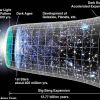 +17 +1
+17 +1The universe 'is expanding FASTER than expected'
Physicists Geoff Chen and Chris Fassnacht of the University of California, Davis and their colleagues took measurements of three gravitationally-lensed bright galaxies called quasars.
-
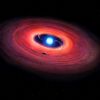 +16 +1
+16 +1Planetary 'autopsies' indicate worlds like Earth common in the cosmos
A new way of studying planets in other solar systems - by doing sort of an autopsy on planetary wreckage devoured by a type of star called a white dwarf - is showing that rocky worlds with geochemistry similar to Earth may be quite common in the cosmos.
-
 +12 +1
+12 +1There Actually Is Sound in Outer Space
You’ve heard it before: In space, no one can hear you scream. That’s because sound doesn’t move through a vacuum, and everyone knows that space is a vacuum. The thing is, that’s not completely true.
-
 +17 +1
+17 +1The universe's oldest black holes could also be its most useful
Primordial black holes born in the moments after the big bang could clear up some of cosmology's most confounding conundrums
-
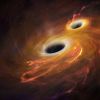 +9 +1
+9 +13 Monster Black Holes Are About to Collide
A rare trio of supermassive black holes has been caught in the act of coming together. Three of the light-gobbling monsters nuzzle shoulder to shoulder in SDSS J084905.51+111447.2, a system of three merging galaxies about 1 billion light-years from Earth, a new study reports.
-
 +24 +1
+24 +1Busy older stars outpace stellar youngsters, new study shows
The oldest stars in our Galaxy are also the busiest, moving more rapidly than their younger counterparts in and out of the disk of the Milky Way, according to new analysis carried out at the University of Birmingham.
-
 +2 +1
+2 +1Cosmologists Debate How Fast the Universe Is Expanding
New measurements could upend the standard theory of the cosmos that has reigned since the discovery of dark energy 21 years ago.
-
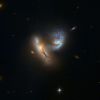 +4 +1
+4 +1Hubble Telescope Spots Two Galaxies in a Doomed (but Dazzling) Dance
The galaxies will ultimately crash into each other.
-
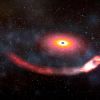 +7 +1
+7 +1Astronomers probably just saw a black hole swallow a dead star
Ripples in the fabric of spacetime reveal what may be a first-of-its-kind cosmic collision.
-
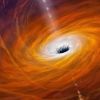 +25 +1
+25 +1This Is Why Black Holes Must Spin At Almost The Speed Of Light
Many of them are spinning at nearly the speed of light. When you do the math, there's no other way it could have been.
-
 +13 +1
+13 +1NASA discovered a cloaked black hole in early universe
Astronomers have discovered evidence for the farthest “cloaked” black hole found to date, using NASA’s Chandra X-ray Observatory. At only about 6% of the current age of the universe, this is the first indication of a black hole hidden by gas at such an early time in the history of the cosmos.
-
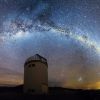 +25 +1
+25 +1New Study Shows the Milky Way Is a Bit Warped
esearchers in Poland have been able to chart our galaxy on a scale bigger than ever before by measuring the distance from our sun to thousands of individual pulsating stars scattered across the Milky Way. A newly created three-dimensional map (see below), which provides a broad view of our location in the cosmos, reveals the S-like structure of the Milky Way’s warped stellar disc. The map was published on Thursday in the journal Science.
-
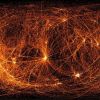 +4 +1
+4 +1Hubble spies a spiral galaxy blooming like roses 70 million light-years away
Around 70 million light-years away, the spiral galaxy NGC 972 appears to be in full bloom.
-
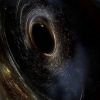 +29 +1
+29 +1We are stardust. And Big Bang dust.
When, in 2017, the LIGO experiment detected gravitational waves from two neutron stars colliding, it sent electromagnetic and gravitational ripples through the universe and the astronomical community.
-
 +15 +1
+15 +1The universe may be a billion years younger than we thought. Scientists are scrambling to figure out why.
New research suggests that the Big Bang that birthed the cosmos occurred 12.5 billion years ago.
-
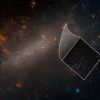 +19 +1
+19 +1Hubble hints today's universe expands faster than it did in the past
For a while now, astronomers have been confronting a conundrum. Studies of the early universe, looking at the era just after the Big Bang, tell us that the cosmos should be expanding at one speed. But when astronomers actually measure today’s universe, they find a faster rate of expansion.
-
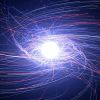 +18 +1
+18 +1The Universe's Dark Secret: Where Did All the Antimatter Go?
Paul M. Sutter is an astrophysicist at The Ohio State University, host of Ask a Spaceman and Space Radio, and author of Your Place in the Universe. Sutter contributed this article to Space.com's Expert Voices: Op-Ed & Insights. So there's this stuff called "antimatter." You may have heard of it. It's just like normal matter, with all the same properties and all the same abilities to make up atoms and molecules, except for one crucial difference: It has an opposite charge. Take the humble electron, for example. Mass of 9.11 x 10^-31 kg. Quantum spin of 1/2. Charge of -1.6 x 10^-9 coulombs.
-
 +4 +1
+4 +1Ask Ethan: Why Haven't We Found Gravitational Waves In Our Own Galaxy?
One of the most spectacular recent advances in all of science has been our ability to directly detect gravitational waves. With the unprecedented power and sensitivity of the LIGO and Virgo gravitational waves observatories at our disposal, these powerful ripples in the fabric of spacetime are no longer passing by undetected. Instead, for the first time, we're able to not only observe them, but to pinpoint the location of the sources that generate them and learn about their properties. As of today, 11 separate sources have been detected.
-
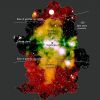 +13 +1
+13 +1Giant X-ray 'chimneys' are exhaust vents for vast energies produced at Milky Way's center
The center of our galaxy is a frenzy of activity. A behemoth black hole—4 million times as massive as the sun—blasts out energy as it chows down on interstellar detritus while neighboring stars burst to life and subsequently explode. Now, an international team of astronomers has discovered two exhaust channels—dubbed "galactic center chimneys"—that appear to funnel matter and energy away from the cosmic fireworks in the Milky Way's center, about 28,000 light-years from Earth.
Submit a link
Start a discussion




















